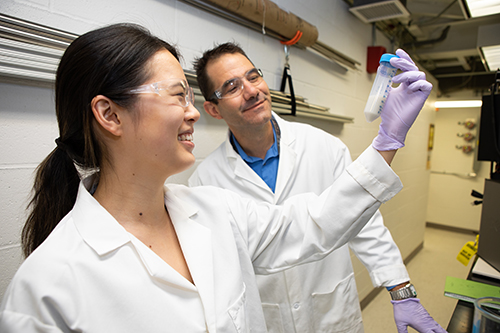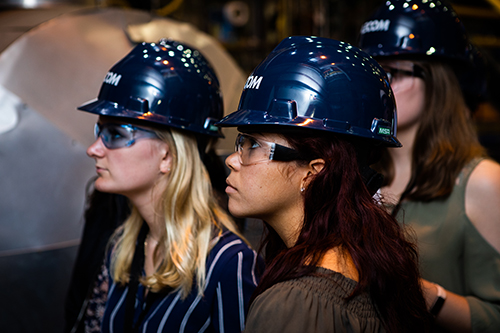Sensors, Controls, and Novel Concepts
Improving fossil energy and carbon management systems through advanced sensors and control technologies
The Sensors, Controls and Novel Concepts Program supports American energy innovation by accelerating the development, testing and application of novel process sensors and control technologies for the fossil energy systems of the future. The program leverages artificial intelligence, machine learning (AI/ML) and high-performance computing to strengthen the nation’s energy security through advances in fossil power reliability, availability and cost-effectiveness.
Sensors are crucial to the operation of industrial processes such as power production and manufacturing. As power plants come online that are more automated for responsiveness to rapidly changing conditions (such as rapid load ramping) more and better sensors are needed, as well as real-time data analytics and control algorithms to make use of the data they produce. These new sensors must be capable of accurate and repeatable real-time measurement in extreme conditions with good spatial resolution and reliable, time-sensitive data communications. NETL develops, tests and matures novel sensor and control technologies that are required in these next-generation energy systems, including hybrid plants that incorporate multiple energy production processes. Combining material innovation with digital integration, the technologies developed by NETL enable testing and deployment of low-cost, reliable fossil energy systems.
The program targets critical applications in harsh environments, including combustion processes, solid oxide fuel cell (SOFC) systems, coal conversion processes, gasification, pyrolysis and chemical looping. The program builds upon its existing expertise in harsh-environment sensors, digital twins, advanced controls and cyber-physical systems, enabling real-time data acquisition, analysis and automated control of production processes. Current research will deploy advanced sensors to support major DOE projects, leveraging the benefits that AI/ML can provide. Furthermore, continued investment in early-stage (low technology readiness level) concepts, such as quantum sensing for fossil energy applications and direct power extraction, is essential in maintaining America’s leadership in energy innovation.
The Sensors, Controls and Novel Concepts Program advances integration of technologies across the following primary research areas:
Harsh Environment Sensors
Sensor development efforts enable and enhance power generation and carbon management technologies ranging from fuel production to postcombustion carbon capture. NETL’s sensor research optimizes sensor arrays, allowing for measurement of desired parameters such as temperature, pressure, fluid composition and the state of materials. Researchers investigate a range of advanced manufacturing techniques (such as 3D printing) to determine the feasibility of embedding sensors with condition-based monitoring algorithms to operate in extreme environments, ranging from pipes and tubing to turbine blades, anticipating maintenance needs and reducing plant downtime. Sensors developed by NETL apprise operators and control algorithms of component health and performance in real time. Robots, ranging from drones to crawlers, have transformed the inspection and repair of equipment for a wide variety of systems. Advances in remote inspection and repair also improve the performance, reliability and economics of power generation.
Advanced Controls and Cyber Physical Systems
NETL’s controls research enables management of increased energy system complexity arising from multiple systems integration. Smart control systems enable an optimal balance between operational efficiency, cost, emissions and reliability and can handle complex interactions of hybrid power systems (fossil fuel and renewable generation, energy storage, carbon management, etc.).
One prominent crosscutting technology developed by NETL is Hybrid Performance (HYPER), a cyber-physical platform that combines virtual numerical models with physical hardware to realize advanced design concepts. HYPER serves as a test bed for novel control and cyber security strategies that will optimize the performance of existing and next-generation power plants, and greatly accelerate and derisk the process of early adoption and commercialization of novel technologies.
Other Novel Concepts
NETL is developing emerging technologies that are essential to U.S. dominance in energy innovation, such as quantum sensing and direct power extraction, moving them from technology development to marketplace adoption.
Learn more:
- Other novel concepts the program is exploring — including direct power extraction, quantum for energy systems and technologies, and cybersecurity.
- Quantum Sensing for Energy Applications — presented at the University of Pittsburgh Infrastructure Sensing Collaboration Workshop.
- Nitrogen Vacancy Center in Diamond for Stress and Field Sensing Applications — presented at SPIE Photonic West 2025.
 Additional Links and Resources
Additional Links and Resources
The Energy Data eXchange (EDX) is the Department of Energy (DOE)/Fossil Energy and Carbon Management's (FECM) virtual library and data laboratory built to find, connect, curate, use and re-use data to advance FECM and environmental R&D. Developed and maintained by the National Energy Technology Laboratory (NETL), EDX supports the entire life cycle of data by offering secure, private collaborative workspaces for ongoing research projects until they mature and become catalogued, curated, and published. EDX adheres to DOE Cyber policies as well as domestic and international standards for data curation and citation. This ensures data products pushed public via EDX are afforded a citation for proper accreditation and complies with journal publication requirements.
The Science-Based Artificial Intelligence and Machine Learning Institute (SAMI)
The Science-Based Artificial Intelligence and Machine Learning Institute (SAMI) builds off NETL’s unique strengths in science-based modeling and research data curation and management capabilities. It also capitalizes on NETL’s world-class capabilities in high-performance scientific computing. This simulation science is driving breakthroughs in advanced materials design and discovery and reducing the cost and risk of carbon capture utilization and storage. More information about SAMI is available at its data exchange webpage.
NETL’s Strategic Systems Analysis and Engineering
NETL’s Strategic Systems Analysis and Engineering group conducts a variety of energy analyses to identify and evaluate promising R&D opportunities. Check out their website for specific studies related to sensors and controls technology.
Cybersecurity, Energy Security, and Emergency Response (CESER)
Cybersecurity, Energy Security, and Emergency Response (CESER) To find out more about DOE Cybersecurity initiatives, check out the Office of Cybersecurity, Energy Security, and Emergency Response (CESER) webpage.
Blockchain Technology BLOSEM is a multi-lab collaboration, led by NETL, that seeks to develop energy-sector guidance, standardized metrics, and testing environments for technology maturation of novel blockchain-based concepts for device security, secure communications, and grid resilience. Check out their website.
Interact with NETL
Explore the Site
NETL implements this effort as part of DOE’s Hydrogen with Carbon Management Research Program.






